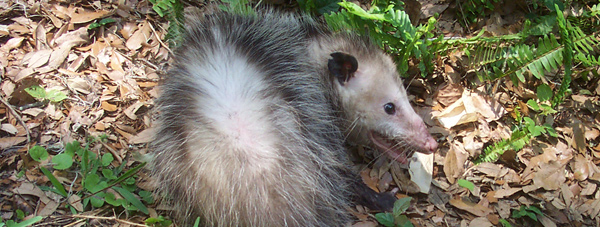- info@wildlife-removal.com
Call us for help in your town
Wildlife Removal Education
What Diseases Can Opossums Carry?
Need opossum removal in your hometown? We service over 500 USA locations! Click here to hire us in your town and check prices - updated for year 2020.
Rabies, Salmonellosis, Tularemia, Coccidiosis, Leptospirosis and Toxoplasmosis are some of the diseases that opossums get infected with and incubate in their systems, which is why care must be taken while handling opossums. Unlike other mammals though, it is rare for an opossum to get infected by the rabies virus due to their low body temperature. Its body temperature of below 95 degree Fahrenheit is one of the lowest out of all mammals.

Humans and animals can easily get infected with any of these diseases if they are bitten by an opossum or they come in direct contact with the biological wastes of one.
Opossums also host parasites like ticks, mites and fleas that latch on to their skin and are abundant anywhere that they den. These parasites also act as vectors who transmit those diseases even though a human is not in direct contact with the opossum.
Toxoplasmosis - This diseases is easily contracted from opossums by pregnant women and people with a weakened immune system. It rarely shows symptoms and this makes it hard to diagnose. However, in rare cases, headache, muscle aches, fever and fatigue may be experienced by the victim.
Leptospirosis - It can be contracted by direct contact with the urine of a diseased opossum. Its symptoms include kidney damage, jaundice, rash, respiratory disorder, vomiting, liver failure, meningitis or even death.
Coccidosis - This parasitic disease is mostly contracted by touching or ingesting particles of opossum feces. Victims of this disease may experience weight loss, loss of appetite, gastrointestinal damage, dehydration, diarrhea, or even death.
Salmonellosis - Caused by the bacteria, Salmonella spp., this disease is highly associated with food poisoning. It is contracted by exposure to feces or urine of the opossum. Aged people, young children and people whose immune system has been compromised are more susceptible to Salmonellosis. Common symptoms include fever, diarrhea and abdominal pain.
Tularemia - This parasitic disease is transferred through the bite of ticks that come from the body of an opossum. Chest pain, breathing difficulty, skin ulcer, mouth ulcers, cough sore threat and inflammation of the eyes are often observed in victims of Tularemia.
Equine protozoa myeloencephalitis (EPM) - EMP mainly affects horses if they consume feces of opossums.
Murine Typhus Fever – This disease can be transmitted from opossum to man and other animals with a flea bite. Symptoms include fever, rash, fatigue, headache and muscle ache
In conclusion, opossums carry lots of diseases which are contagious and can be life threatening to victims. Therefore, protective gear like hand gloves and nose covers must be donned when handling opossums and other critters.
Go back to the Opossum Removal page.


















